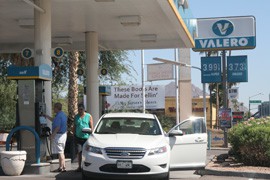Cronkite News has moved to a new home at cronkitenews.azpbs.org. Use this site to search archives from 2011 to May 2015. You can search the new site for current stories.
Experts: Arizona shielded from California-style spike in gasoline prices
PHOENIX – With drivers in California paying more than $5 a gallon for gasoline after a sudden spike in prices, could Arizona motorists be next?
The short answer: probably not.
Among the reasons: Arizona has lower taxes, doesn’t use the expensive blend that California requires, has diverse sources for its gasoline and doesn’t face the recent supply interruptions plaguing its neighbor to the west.
California’s supply problems began with an August fire at a Chevron refinery in the Bay Area. The problem was exacerbated by Exxon Mobil Corp.’s refinery in the Los Angeles area losing power and two Phillips 66 refineries and a pipeline in Northern California shutting down.
But while California prices increased around 50 cents per gallon last week and averaged $4.65 per gallon Tuesday, Arizona prices inched up 2 cents to average $3.67 per gallon Tuesday.
“Arizona is fairly insulated from the wild price swings that California is experiencing, and that’s because we are not solely reliant on California for fuel,” said Michelle Donati, spokeswoman for AAA Arizona.
Arizona receives fuel from two primary sources: about half from a pipeline out of Southern California and half from a pipeline connecting with the Gulf of Mexico through Texas, Donati said.
Meanwhile, California requires gasoline reformulated to meet stricter air quality standards. In other words, gasoline sold in Arizona couldn’t be sold in California.
“Unfortunately, California is really an island unto itself when it comes to its oil and gasoline infrastructure,” said Gregg Laskoski, senior petroleum analyst with GasBuddy.com. “Nobody else needs that gas and nobody else wants it.”
Brian Youngberg, senior energy analyst with Edward Jones in St. Louis, said that because the recent disruptions happened as the state was preparing to transition to its cheaper-to-produce winter fuel blend, the supply faced further pressure.
“There is limited supply of the fuel made for summer,” Youngberg said in an email. “Arizona does not have that issue.”
Ram M. Pendyala, a professor specializing in transportation systems with Arizona State University’s School of Sustainable Engineering and the Built Environment, said differences in gasoline taxes are the primary reason behind the large disparity between prices in Arizona and California, regardless of unforeseen disruptions.
Arizona’s combined federal and state tax on gasoline is 37.4 cents a gallon compared to 67.5 cents a gallon in California.
While Arizona won’t see a cascading effect from the recent events in California, Pendyala said there could be secondary impacts.
“There may be trucking companies and tourists and visitors who are impacted because they have to fill up their tank in California,” he said. “It’s likely to be more on the margin.”
Timothy James, director of research and consulting at the ASU’s L. William Seidman Research Institute and research professor in economics at the W.P. Carey School of Business, said that while Arizona is heavily dependent on California as a supplier, he’d be surprised if things got really bad in Arizona.
“There’s a bit of a lag in when that effect becomes live here,” James said. “These are all short-term effects.”








